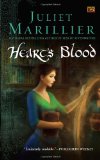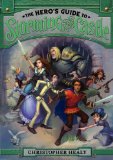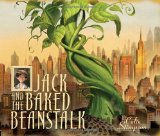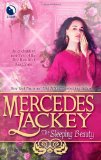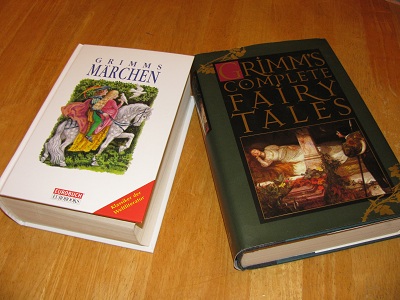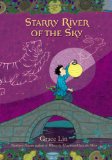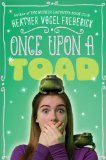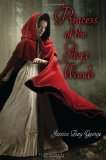 Princess of the Silver Woods
Princess of the Silver Woods
by Jessica Day George
Bloomsbury, 2012. 322 pages.
Starred Review
I finally got a chance to read Princess of the Silver Woods! It first came out when I was busy reading books for the 2012 Cybils, but too late in the year to be eligible for one. Princess of the Silver Woods wraps up the trilogy begun in Princess of the Midnight Ball and continued in Princess of Glass. Yes, you should read the earlier books to fully appreciate this one.
All the books play off specific fairy tales. The first one, which laid the groundwork, played off “The Twelve Dancing Princesses.” The second one played off “Cinderella.” This one plays off “Little Red Riding Hood.”
And now we interrupt this review for a mini-rant.
What IS it with the “Red Riding Hood” take-offs? People, “Little Red Riding Hood” is not a romantic story! What are you all doing basing romantic novels on that plot? Enough already! It probably didn’t help that the first one I read was Cloaked in Red, by Vivian Vande Velde. Unlike the others, Cloaked in Red is not a romantic novel, but a collection of stories from different perspectives, all based on “Little Red Riding Hood.” Pretty much all variations are covered. It’s fun and it’s silly, and there’s a story where each different character shines.
The three recent romantic novels that played off the story were Beauty and the Werewolf, by Mercedes Lackey; Scarlet, by Marissa Meyer; and Princess of the Silver Woods, by Jessica Day George. What’s more, I’ve had Cloaked, by Alex Flinn, sitting on my shelf at home for months. I think I understand now why I haven’t gotten around to reading it.
Of these, my favorite was probably Beauty and the Werewolf — and that’s particularly because it got off the story of “Little Red Riding Hood” and made far more parallels with “Beauty and the Beast,” a fairy tale that is romantic and that I do love (however twisted it may be).
But you know what? By the third time someone’s making the “wolf” the romantic hero and the huntsman the sinister villain, I no longer find that the least bit innovative. And the “grandmother”? (Though Beauty and the Werewolf didn’t have one.) Whatever weird situation you’re getting her into, I really don’t care.
Okay, mini-rant is over. Now let’s talk about why I loved Princess of the Silver Woods in spite of that.
And, yes, I loved Princess of the Silver Woods. Fortunately, the “Little Red Riding Hood” parallels were not a big part of the story. Sure, she wore a striking red cloak, but I don’t mind that. And yeah, he’s part of a gang of bandits that call themselves “The Wolves of Westfalin,” but really he’s good at heart, and an earl who’s lost his land. He only steals because he has to feed his people.
[I’ll try to spare you another mini-rant. What is it with the romantic thief? No, I don’t find thieves attractive. Gen wins me over in spite of that, and The False Prince eventually, too. But being a good thief is not an admirable quality, okay? It doesn’t belong to you. Leave it alone, for crying out loud! Find some field work to do! You don’t have to steal! Okay, I’ll stop. That also wasn’t a big part of this book.]
Okay, I’m starting to wonder why I did like this book!
But the situation Petunia, the youngest of the twelve princesses, finds herself in is compelling. She’s visiting a grand duchess with a handsome grandson. (He’s a huntsman, so that can’t be good.) She’s having horrible nightmares, in which she’s back in the Kingdom Under Stone (from the first book, based on “The Twelve Dancing Princesses.” Such a sinister place). In her dreams, Kestilan, the prince of the Under Stone kingdom, says she will have to marry him. And then Oliver, the landless earl who’s turned to banditry, sees something chilling:
It was very late, and all the windows were dark. Oliver found himself praying silently that someone would light a lamp or a candle, even if the light exposed him. What were those things crawling across the lawn? With a mounting sense of horror, he saw the dark shapes reach the house.
With a terrible laugh, the shadow creatures pulled themselves up the wall to a window on the second floor that was open despite the cold. Oliver hid behind a fountain. The room they had just entered had been his childhood bedroom. Whose was it now? He prayed again, this time that the room had not been given to Petunia.
His question was answered a few moments later when a young woman’s voice cried out, the sound carrying clearly through the open window. She screamed out denials, she screamed out insults, and over and over again she reviled someone called “Kestilan.”
“Oh, ye gods, Petunia,” Oliver whispered from his concealment. “What is all this?”
After the shadows leave the house, they come across the lawn toward Oliver:
“Stay away from her,” Oliver said, trying to sound dangerous and not terrified.
Another cackling laugh. The shadow reached out and put its hand into Oliver’s chest. A sheath of ice instantly covered his heart, and then the shadow squeezed. Oliver gasped as intense pain flared in his chest, streaking through his entire body. He tried to step back but found that he couldn’t move so much as an eyelid.
“She is not for you,” the shadow said in a low, harsh voice. “She is for us. All of them are for us.”
That was enough to hook me. I had to find out if Petunia and her eleven sisters could rid themselves of the foe they thought they’d already defeated, the King Under Stone, once and for all.
JessicaDayGeorge.com
bloomsburyteens.com
Buy from Amazon.com
Find this review on Sonderbooks at: www.sonderbooks.com/Teens/princess_of_the_silver_woods.html
Disclosure: I am an Amazon Affiliate, and will earn a small percentage if you order a book on Amazon after clicking through from my site.
Source: This review is based on a library book from the Fairfax County Public Library.
Disclaimer: I am a professional librarian, but I maintain my website and blogs on my own time. The views expressed are solely my own, and in no way represent the official views of my employer or of any committee or group of which I am part.
Please use the comments if you’ve read the book and want to discuss spoilers!
